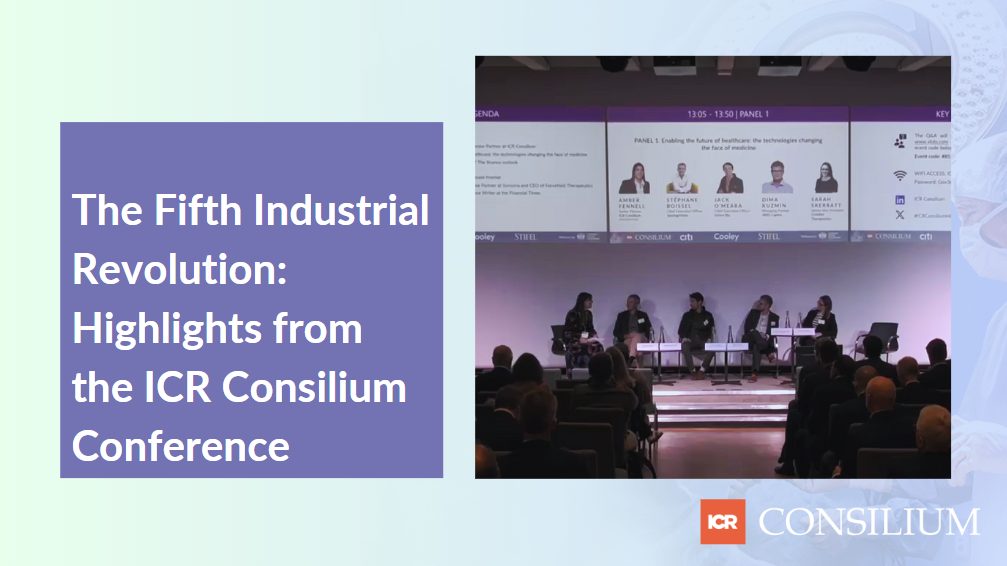
This year’s ICR Consilium Conference was entitled “The Fifth Industrial Revolution”, and the premise was to look at how biology and technology are coalescing in healthcare and the opportunities and challenges this presents.
So, it was fitting that Panel 1: Enabling the future of healthcare, the technologies changing the face of medicine, took on the hard questions about AI. Our speakers were drawn together by a common immersion in cutting-edge technologies: Stéphane Boissel, President and CEO, SparingVision; Dima Kuzmin, Co-Founder and Managing Partner, 4BIO Capital; Jack O’Meara, Co-founder and CEO, Ochre Bio; and Sarah Skerratt, Senior VP, CHARM Therapeutics talked to ICR Consilium’s Senior Partner, Amber Fennell.
It didn’t take long for the question about how AI is changing drug development to come up. Dima Kuzmin insisted that humans still do many things better than machines. There are certainly some areas of our industry – what Dima puts in the “easy for AI, hard for humans” category, such as imaging and protein fold prediction – which AI has revolutionised. But areas such as drug synthesis are inappropriate to be left in the hands of machines. “AI is way too dangerous at the moment,” he concluded.
For CHARM’s Skerratt however, AI is already driving meaningful change. “If you look at imaging techniques driven by AI: rapid cancer diagnosis, manufacturing processes, real world and clinical data – we’re making real strides now as we work as a community.”
Panel 2: Are we nearly there yet? The financing outlook, assembled speakers representing public and private companies and investors. Alethia Young, Chief Financial Officer, Bicycle Therapeutics; Jorge Santos da Silva, Founder and Chief Executive Officer, MoonLake Immunotherapeutics; Riad Sherif, Chief Executive Officer, Oculis; Alan MacKay, Managing Partner & Founder, GHO Capital; and Chris Hollowood, Chief Executive Officer, Syncona, were moderated by Stifel’s Nicholas Moore.
The moribund state of the current public markets drove some inevitable introspection. Santos da Silva observed that amid a tendency towards “herd” behaviour among some investors, companies need to focus relentlessly on their most important assets. “The biggest reason companies fail is distraction.” he said.
GHO’s Mackay says that valuations for the right private companies remain strong. But there’s no doubt that the market environment has driven changes in investment strategy, said Bicycle’s Young, with financing moving away from “event-driven” approaches and towards focusing on raising money whenever possible. As far as predictions for 2024 go, few on the panel were prepared to call the end of the drought, and Young said she thought the first half of the year would remain “rough”. But optimist Nick Moore thinks there will be light at the end of the tunnel by the spring.
Panel 3: The Brain, the final healthcare frontier, focused on recent innovation in brain medicine. Bharatt Chowrira, President and Director, PureTech Health; Paul M Matthews, Director, UK Dementia Research Institute at Imperial College London; Philip Scheltens, Partner and Head of the Dementia Fund, EQT; Alan Watt, CEO, Nodthera; and Beverley Carr, Interim CEO, Amphista Therapeutics, spoke on a panel moderated by Cooley’s Nicola Maguire.
It’s impossible to talk about this sector without acknowledging the impact that the approval of two new Alzheimer’s drugs has had. Nevertheless, Philip Scheltens was clear that despite the buzz around CNS, there still needs to be “a lot more money put into biotech in this particular disease area”. There is much to be excited about, however, with new understanding of biomarkers and increasing willingness among researchers to share data, all promising to support this continuing reinvigoration. Other panelists talked of the importance of previously neglected areas of brain health, including depression and the gut-brain axis. “We are seeing a lot more interest from pharma companies in the neuro space. There is a lot of excitement in partnering around neuro diseases,” Beverley Carr commented.
John Tsai, CEO of Forcefield Therapeutics and Executive Partner at Syncona, concluded the day in a discussion with Clive Cookson, Senior Science Writer at the Financial Times. As well as discussing his enthusiasm about moving from large pharma (Novartis and Amgen) to a start-up, Tsai made a powerful case for the urgency of increasing diversity: both in clinical trials and in broader recruitment. In response to a question about whether cardiovascular trials need to better reflect the needs of obese people, Tsai said it was critical. He also talked about how clinical studies could be generated in part through decentralised and technology driven solutions. Tsai said that the industry has a real opportunity to tell a story about the positive change it brings.
Each panelist certainly has the potential to help tell this story. We look forward to seeing you next year.



